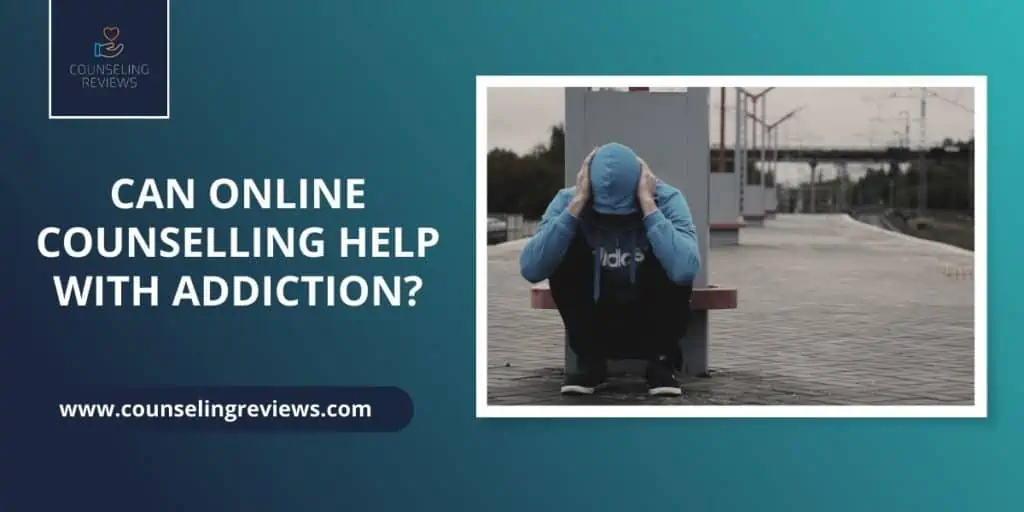Many people feel like their battle with alcohol addiction is an individual struggle. This is untrue as other people are fighting the same struggles with addiction, and there are resources to help.
Some in-person addiction counseling can be unreasonable. First, therapy programs like rehab facilities seem to be ineffective because they can take months out of people’s lives. Additionally, people struggling with addiction may feel a sense of shame by seeking out help in person treatment first, and it does not help that a lot of these programs can be expensive.
Getting addiction therapy does not have to be this way. Online counseling may be a better option for you.
The Right Time to Reach Out for Help
According to the Substance Abuse and Mental Health Services Administration (SAMHSA), people with substance abuse disorders occur when someone regularly uses alcohol and/or drugs, and their use has a significant impact on daily life. Some of these impacts include failure to complete routine activities in work, home, or school, as well as health problems and impairments.
If you have a feeling that substance use has taken over your daily activity, then you should consider looking into a substance use disorders and abuse treatment plan. You may think that merely detoxing can treat the addiction; however, you still have a high chance of relapsing. Attending therapy can help with both detoxing and preventing relapse.

Different Treatment Approaches
If you decide to seek out counseling or treatment, there are many approaches to investigate.
One approach is to attend therapy sessions with family members or loved ones. They, too, can be impacted by your struggle with addiction, so you can choose to have them at live sessions and be a part of your recovery process. They can also help motivate you to complete therapy.
Another approach is to attend support groups or participate in group therapy. Many people are fighting the same battle. Group therapy can give you a chance to overcome alcohol abuse or drug addiction alongside other people with the same struggles.
For people who have a mental health condition, individual therapy with a licensed therapist is also a good option. Counselors can create a plan that tailors to your personal needs.
Cognitive-behavioral therapy is also a great approach to treating addiction through counseling. This approach teaches you how to recognize actions, thoughts, and feelings that trigger drug use. With this method, a therapist should teach the skills that replace harmful habits with healthy ones.
The Benefits of Online Counselling
Studies show that online counseling is useful for those battling alcohol and drug addiction. Not only best online, is it typically cheaper, it can also give addicts a safe place to find the help they need.
One advantage of online counseling is that it is accessible to almost anyone with an electronic device and internet connection. If you have both, then you can easily investigate online counseling. Plus, you can get therapy on your own time and schedule online therapy when it best fits your schedule.
Another benefit of online counseling is that there is more privacy. There is a stigma surrounding counseling and therapy for addiction. People may feel shameful for having to seek out for help. With online counseling services, there can be less remorse because you can complete sessions when you want and where you want.
Effectiveness of Online Addiction Therapy
Traditional addiction treatments often face issues of underutilization and high dropout rates, indicating potential gaps in meeting individuals’ needs. Online therapy platforms can address these challenges, providing online therapy providers with a valuable alternative for those who may not seek or adhere to traditional treatments.
A review of studies suggests that some online therapy services can lead to immediate reductions in substance use post-treatment and maintain these positive effects in the long term. However, further research is needed to explore and compare the effectiveness of various online therapy options comprehensively.
In some cases, online therapy has demonstrated advantages over traditional therapy. For instance, research reported in the American Journal of Psychiatry revealed that participants in web-based treatment exhibited higher success rates and lower dropout rates compared to those undergoing individual or group counseling.
Tips and Strategies for Maximizing Your Online Therapy Experience
- Build a Strong Therapist Relationship:
- Establishing a rapport with your therapist is crucial for a successful therapy experience. Ensure that your therapist comes across as genuine and empathetic, creating an environment where you feel safe, respected, and comfortable. Discuss with your therapist how to foster this connection in an online setting.
- Transitioning to Online Therapy:
- If you’re shifting from traditional face-to-face therapy to online treatment, have a conversation with your therapist about the process. Address any concerns or challenges that may arise during the transition and work together to find effective solutions.
- Exploring Online Support Groups:
- If you’re considering moving from in-person support groups to online forums, take the time to research available options. Consider factors like the format of group meetings, the group’s size, and the level of participation required. Choosing a group that aligns with your preferences and needs is essential for a positive experience and meaningful support.
What to Expect in Online Addiction Therapy Sessions
Online addiction treatment employs technology to provide or enhance psychotherapy. Several online therapy options are available for addiction treatment:
- Therapist-Led Online Therapy:
- Therapists utilize online video calls, phone conversations, emails, or chat platforms to conduct virtual sessions with clients. These sessions closely resemble traditional in-office therapy but are conducted through online tools. Note that for security and privacy reasons, therapists often use HIPAA-compliant platforms like VSee, Doxy.me, or Zoom, especially once COVID-related allowances are lifted.
- Computer-Assisted Therapy:
- Individuals can engage in interactive online programs that guide them through the treatment process with minimal therapist interaction. This approach involves watching instructional content, completing computerized assessments, following tutorials, and finishing homework assignments as part of a structured set of lessons.
- Web-Assisted Therapy:
- This method may involve the use of mobile apps or online therapy websites to guide individuals through therapy sessions or activities.
- Technology-Supplemented Therapy:
- Some treatments combine traditional in-person therapy with technology, such as text messaging, phone calls, video chats, or mobile apps, to enhance the therapeutic process.
The choice of approach depends on several factors, including the severity of your symptoms, the level of treatment needed, your comfort and familiarity with technology, and your therapist’s proficiency with technology. In cases requiring hospitalization, long-term residential treatment, medication management or supervised detox, online therapy may not be suitable.
Appropriate Channels to Seek Help From
If you do not know where to start with online counseling or counseling in general, then look into SAMHSA’s national helpline. While they do not provide online counseling help with addiction, they have professional counselors who can refer you to other counseling that best fits your needs. Plus, the hotline is available all day, every day.
Other Mental Health Issues that Online Counselling Can Support
While online counseling can help treat addiction, it can also help with other mental health conditions. People with conditions like stress, anxiety, and depression can seek counseling online.
If you feel that online counseling is not sufficient, or you have thoughts of self-harm, please seek out in-person help or more intensive therapy.
People Suitable for Online Counselling and Conclusion
Online counseling can be an effective way to treat addiction. There is more privacy, it can be a bit cheaper, and it is very accessible. Anyone with internet and concern about addiction or mental health treatment can participate in online counseling. However, everyone is different; if you feel that online counseling is ineffective, then seek out counseling that is more intensive or more personalized.




